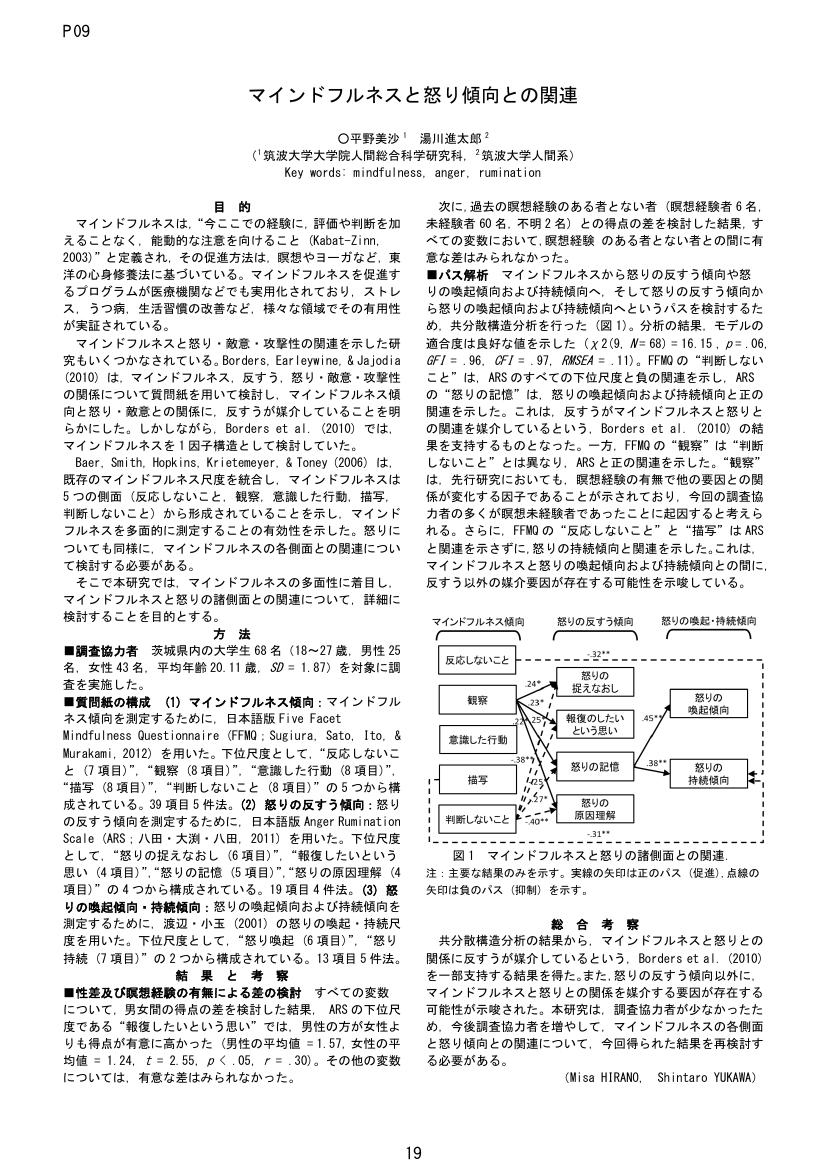9 0 0 0 OA マインドフルネス瞑想の怒り低減効果に関する実験的検討
- 著者
- 平野 美沙 湯川 進太郎
- 出版者
- 公益社団法人 日本心理学会
- 雑誌
- 心理学研究 (ISSN:00215236)
- 巻号頁・発行日
- vol.84, no.2, pp.93-102, 2013-06-25 (Released:2013-09-01)
- 参考文献数
- 43
- 被引用文献数
- 8 6
This study explores the impact of mindfulness meditation on anger. A meditation group (N = 37) attended 5-10 minutes of mindfulness meditation daily for a week. They were assessed with self-report scales measuring three aspects of anger (rumination, arousal, and lengthiness) before, just after, and four weeks after their one-week participation. Their scores were compared to a control group (N = 27), which was assessed at the same intervals as the meditation group. The meditation group was also asked to evaluate their current mood using the Affect Grid before and after each meditation. The results indicated that participants in the meditation group who continued meditation voluntarily after the week of their participation had decreased anger rumination scores just after and four weeks after their participation. Additionally, the pleasant score on the Affect Grid increased after meditation for almost all the participation days. These findings suggest the efficacy of mindfulness meditation on improving the tendency to ruminate about anger episodes in the medium term to long term, and also on improving mood in the short term.
5 0 0 0 マインドフルネス瞑想の怒り低減効果に関する実験的検討
- 著者
- 平野 美沙 湯川 進太郎
- 出版者
- The Japanese Psychological Association
- 雑誌
- 心理学研究 (ISSN:00215236)
- 巻号頁・発行日
- vol.84, no.2, pp.93-102, 2013
- 被引用文献数
- 6 1
This study explores the impact of mindfulness meditation on anger. A meditation group (<i>N</i> = 37) attended 5-10 minutes of mindfulness meditation daily for a week. They were assessed with self-report scales measuring three aspects of anger (rumination, arousal, and lengthiness) before, just after, and four weeks after their one-week participation. Their scores were compared to a control group (<i>N</i> = 27), which was assessed at the same intervals as the meditation group. The meditation group was also asked to evaluate their current mood using the Affect Grid before and after each meditation. The results indicated that participants in the meditation group who continued meditation voluntarily after the week of their participation had decreased anger rumination scores just after and four weeks after their participation. Additionally, the pleasant score on the Affect Grid increased after meditation for almost all the participation days. These findings suggest the efficacy of mindfulness meditation on improving the tendency to ruminate about anger episodes in the medium term to long term, and also on improving mood in the short term.
3 0 0 0 OA マインドフルネスと怒り傾向との関連
- 著者
- 平野 美沙 湯川 進太郎
- 出版者
- 日本感情心理学会
- 雑誌
- 感情心理学研究 (ISSN:18828817)
- 巻号頁・発行日
- vol.20, no.Supplement, pp.19-19, 2013 (Released:2013-04-10)
2 0 0 0 OA 小学校英語の課題ーフォニックスの導入に向けてー
- 著者
- 平野 美沙子
- 雑誌
- 環境と経営 : 静岡産業大学論集 = Environment and Management : Journal of Shizuoka Sangyo University
- 巻号頁・発行日
- vol.22, no.1, pp.55-66, 2016-06-01
1 0 0 0 OA いじめを考える心理学 - いじめの深刻化を防ぐために -
- 著者
- 平野 美沙子
- 雑誌
- 環境と経営 : 静岡産業大学論集 = Environment and management : journal of Shizuoka Sangyo University
- 巻号頁・発行日
- vol.21, no.1, pp.9-16, 2015-06-01
1 0 0 0 OA 怒りの喚起状況と怒りに伴う身体感覚の変化に関する探索的検討
- 著者
- 平野 美沙 湯川 進太郎
- 出版者
- 筑波大学心理学系
- 雑誌
- 筑波大学心理学研究 (ISSN:09158952)
- 巻号頁・発行日
- no.44, pp.57-67, 2012-08-10
